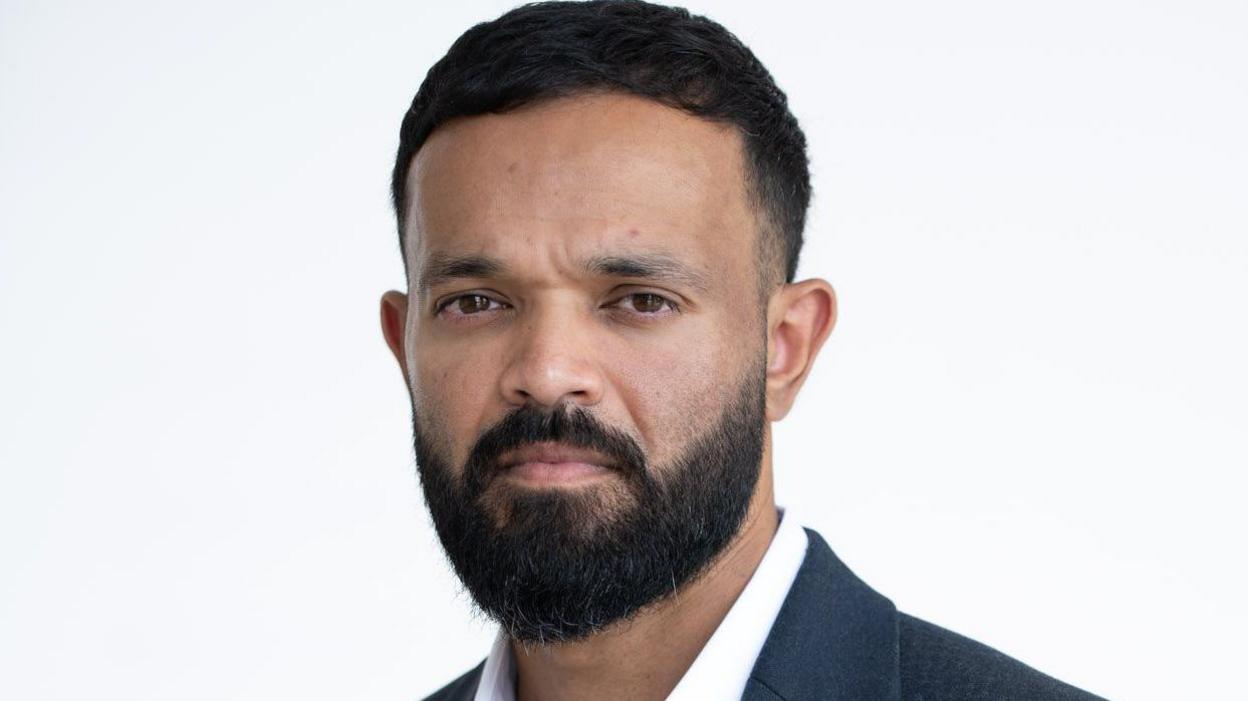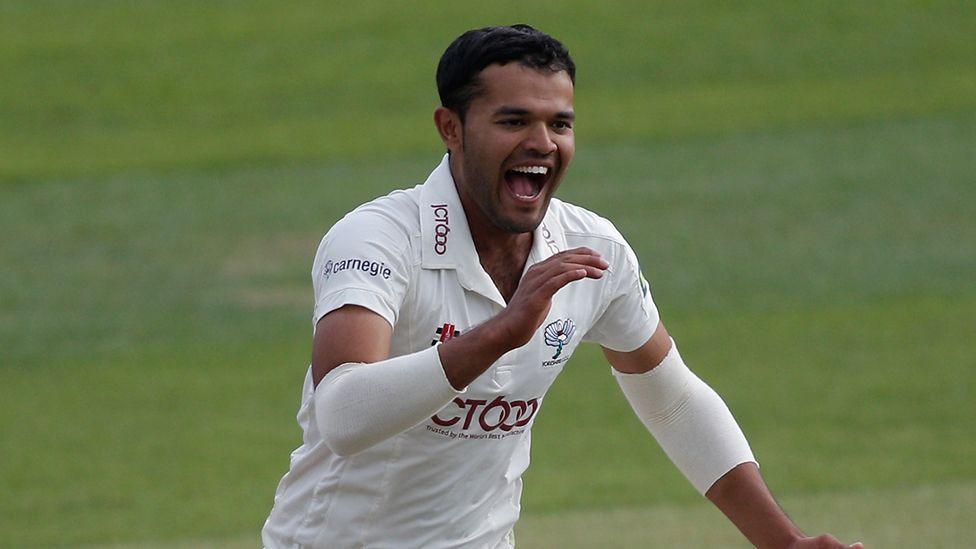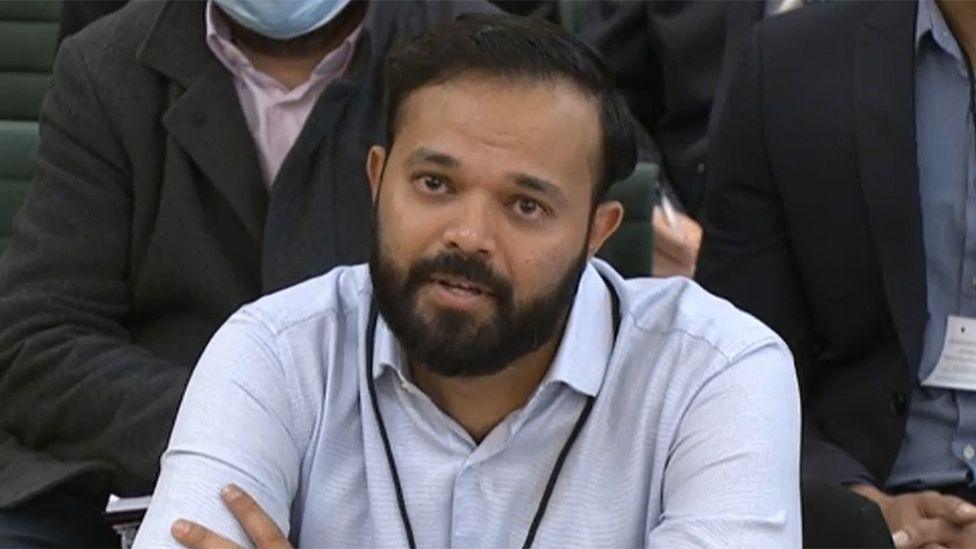I've got scars but no regrets from speaking out, says Azeem Rafiq

Azeem Rafiq says he wants more people to stand together to tackle discrimination
- Published
Azeem Rafiq has faced threats, abuse and claimed to have been driven out of the country since speaking out against racism in cricket.
But, reflecting on the past few years, he says he doesn't "regret it at all".
"It was a lot for me, for my family, but they've been there with me throughout," he tells BBC Asian Network.
The ex-cricketer has spoken openly, and often emotionally, about his experiences during his time as a player in Yorkshire.
A 2023 hearing found Rafiq's allegations against five former players were proven, and that the group had brought the game into disrepute through their use of racist and/or discriminatory language.
"The more I've spoken about it, the easier it's got for me. But still, there are certain aspects that really take me back to them days," he says.
'Cricket has given me some scars'
Rafiq says there have been negative and positive sides to speaking out.
On one hand he says parents whose children have experienced racism have told him they've felt empowered to speak up.
But, on the other, Rafiq says he still hears about cases where complaints "fall on deaf ears".
"In most cases, people will get tired and leave it," he says.
"I would hope that people will think twice now before using racial language."
Born in Pakistan, Azeem says the country helped spark his love of cricket.
He moved to the UK in 2001, the year of the 9/11 terror attacks, and says that was when he first encountered racism.
"A lot has changed, a lot hasn't," he says.
"We don’t have the same level of vile, violent attacks."
But in Rafiq's view some things feel "arguably worse" for British Muslims today than they did 20 years ago.
"The rhetoric, language, the division, [and] the othering" can be "exactly the same", he says.
"How are we in a situation, in 2024, that we're still fighting just to have simple dignity and respect?"

Rafiq says he's proud of what he's achieved on the cricket field
Rafiq thinks healing divisions will be key to tackling bigger problems, and that includes members of the South Asian community helping each other too.
When he gave evidence to a Digital, Culture, Media and Sport Select Committee hearing, there were instances when he broke down in tears.
But he says there were people from within his own community who claimed he "put on the crying".
"That sort of mindset is, sadly, the very reason the system is able to divide," says Rafiq.
He says looking inwards will mean "an uncomfortable conversation" for the South Asian community but an important one.
"Some people are not going to like it. And that's completely fine," he says.

Rafiq has hit back at people who accused him of faking emotion during his testimony before MPs
Rafiq says there's still a long way to go to tackle discrimination, and more work is needed to "understand the problem first".
"There is not one problem everywhere. It shows up differently in different places," he says.
"And when it comes to a solution, you can't have blanket solutions. This is human behaviour."
Rafiq says his own experiences as a result of being confronted with antisemitic comments, that he later apologised for, were illuminating for him.
"Apologising was only the start for me," he says.
"I've had the most amazing support from the Jewish community as I tried to find out and learn more."
Rafiq has said spending time with Jewish people and visiting the Auschwitz concentration camp helped to educate him.
He believes that others could also learn a lot from spending time in different spaces.
"If we spend more time in each of them, understand each other more, then we are going to create a level of respect," he says.
"I said something that hurt a large section of people that actually supported me.
"It was on me to apologise but, also, I don't get to decide whether I'm forgiven or not."
Rafiq 'driven out of country' by threats and abuse
- Attribution
- Published13 December 2022
Jay Sean’s search for the next generation of South Asian talent
- Published2 June 2024
Is online abuse of South Asian football fans ignored?
- Published1 March 2024
Rafiq says he wants to use his new platform "to try and create opportunities for those that don’t have it".
And that includes cricket.
"Regardless of what's happened in the last few years, the one thing I was pretty determined to make sure is that, my love of this game is not taken away.
"Yes, it has given me some scars that I will probably carry for the rest of my life.
"We're just going to make sure that together, we get the respect that we deserve," he says.
Azeem Rafiq's book It's Not Banter, It's Racism is out now.
